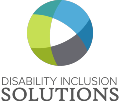Deciding if and when to disclose a disability to an employer is a personal and often challenging decision. Some disabilities are obvious to those around you. But others, like depression, chronic pain, or hearing loss, can be kept hidden. While every person with a disability who does not disclose has his or her reasons, hiding a disability may create unnecessary stress and anxiety.
The belief that keeping quiet may keep workplace stigma and discrimination at bay, keeping a major part of yourself a secret actually prevents people with disabilities from being able to bring their whole self to work.
Aside from enabling people with disabilities to live an authentic life, disclosing a disability to an employer allows for accommodations requests that will allow them to better perform the functions of a job. The iDisability™ training module, “Employee Disability Disclosures and Accommodations” was designed to help employees at every level understand the impact of disclosure, and help them make informed decisions about the effects of disclosure.
With 38 distinctly practical modules, the iDisability™ e-learning platform has already helped train and educate nearly 2 million business users across a variety of industries. We’re confident the technology can also get your team up to speed on many different aspects related to disability inclusion in the workplace. Complete the contact form and allow us to help your organization succeed in its disability inclusion training and development.





0 Comments